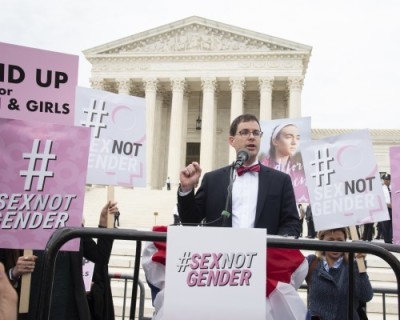Christian-owned funeral home pays $250K in settlement over transgender employee firing

A Michigan-based Christian-owned funeral home has agreed to pay $250,000, as part of a legal settlement, to the estate of trans-identified individual that the company fired.
RG & GR Harris Funeral Homes reached a settlement on Monday with the U.S. Equal Employment Opportunity Commission and the estate of the late Anthony Stephens, who went by the name Aimee, over a lawsuit originally filed in 2014 when Stephens was still alive.
At issue was Harris’ decision to fire Stephens, a biological male, who began dressing as a woman and underwent gender transition to become Aimee. The funeral home had cited their religious objections to transgender ideology as justification for the termination.
Chase Strangio, deputy director for the American Civil Liberties Union LGBT & HIV Project, who worked on the case on behalf of Stephens, celebrated the settlement resolution.
“This settlement marks a closing chapter in Aimee Stephens’ remarkable fight for justice. We are sad that Aimee is not here to experience this moment with [his] wife Donna,” said Strangio in a statement released Wednesday.
“As Aimee always said, this fight is about more than just [him] and it will stretch far beyond this case.”

Strangio went on to call upon the expected Biden administration to “make it clear that across all areas of federal law sex discrimination protections apply to LGBTQ people.”
“We will honor Aimee's legacy by continuing [his] fight for a country where all trans and non-binary people belong and feel safe,” added Strangio.
The settlement was reached after the United States Supreme Court ruled 6-3 in favor of Stephens and two other LGBT individuals who were fired on the basis of sexual orientation.
The cases, known as Altitude Express Inc. v. Zarda, Bostock v. Clayton County, Georgia, and R.G. & G.R. Harris Funeral Homes v. Aimee Stephens & EEOC were combined into one decision.
Justice Neil Gorsuch authored the majority opinion, concluding that Title VII of the Civil Rights Act of 1964 does apply to sexual orientation and gender identity, even though neither category is specifically mentioned by the law or that Congress had originally intended for that interpretation.
“The statute’s message for our cases is equally simple and momentous: An individual’s homosexuality or transgender status is not relevant to employment decisions,” wrote Gorsuch. “That’s because it is impossible to discriminate against a person for being homosexual or transgender without discriminating against that individual based on sex.”
Although the majority opinion agreed that certain claims under the Religious Freedom Restoration Act “might supersede Title VII’s commands in appropriate cases,” many considered the ruling to be a blow to religious liberty.
“We are disappointed the Supreme Court chose to radically re-write the statute by expanding its meaning to cover 'gender identity' and 'sexual orientation,’” stated Peter Sprigg of the Family Research Council in response to the decision.
“The failure of LGBT activists to achieve their goals through the democratic process is no excuse to simply bypass that process and obtain their goal by judicial fiat instead.”
The Heritage Foundation's senior research fellow Ryan T. Anderson also took issue with the decision, arguing that the Supreme Court “has rewritten our civil rights laws in a way that will undermine protections and equal rights of women and girls.”
“It will also expose employers that are struggling to recover from the coronavirus pandemic to significant liabilities,” he stated.
“Congress has not legislated such an outcome and it was wrong for the court to usurp lawmakers’ authority by imposing such an extreme policy on our nation.”





















